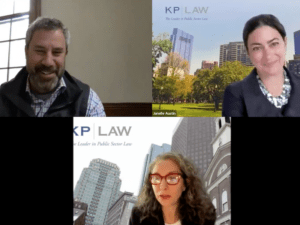Who is a member?
Our members are the local governments of Massachusetts and their elected and appointed leadership.

The MMA held a webinar to highlight the importance of government transparency and review developments related to the state’s public records and open meeting laws. Speakers included (clockwise from top left) Northbridge Town Manager Adam Gaudette, KP Law attorneys Janelle Austin and Lauren Goldberg.
The MMA today hosted a webinar to highlight the importance of government transparency and review developments related to the state’s public records and open meeting laws.
Attorneys Lauren Goldberg and Janelle Austin of KP Law addressed the current state of each law, as well as practical considerations for municipalities given a Massachusetts Supreme Judicial Court decision in March regarding public comment at meetings of government bodies.
Goldberg began by discussing the types of meetings subject to the open meeting law, as well as rules that must be followed during a meeting, and common violations. She also offered practical approaches to avoid violations when using email and social media.
Austin added that activity on email, social media and Zoom accounts have public records implications and are subject to the open meeting law. It is essential, she said, to limit email use to scheduling and avoid conducting community business via email.
Regarding public participation, Goldberg emphasized that the open meeting law does not require municipalities to offer public comment periods during board and committee meetings, though some municipal charters and special acts do require them. Goldberg said municipalities can develop policies to regulate the process for public participation, but they cannot impose restrictions on the content.
Goldberg and Austin reviewed the recent SJC decision in Barron v. Kolenda (“Southborough”), where the court observed that “[a]lthough civility can and should be encouraged in political discourse, it cannot be required.”
To the extent that public comment is permitted, the rights of individuals participating are protected by articles 16 and 19 of the Massachusetts Declaration of Rights. For these reasons, Goldberg and Austin said, municipalities should ensure that any regulation of public comment periods is limited to reasonable time, place and manner restrictions, rather than mandated civility, or other content-based restrictions.
Regarding public records and records requests, Austin said requests may be made in person or in writing, by mail or email. Providers must list specific exemptions and provide detailed explanation of the application of an exemption to the requested record. The municipal records access officer must respond to the request within 10 business days, excluding weekends and holidays.
Northbridge Town Manager Adam Gaudette moderated the question and answer session, where attendees asked about the implications of using private accounts or devices, publicizing board minutes and agendas, and responding to public comments.
• Overview and Current Trends: Open Meeting and Public Records Laws presentation (2.5M PDF)